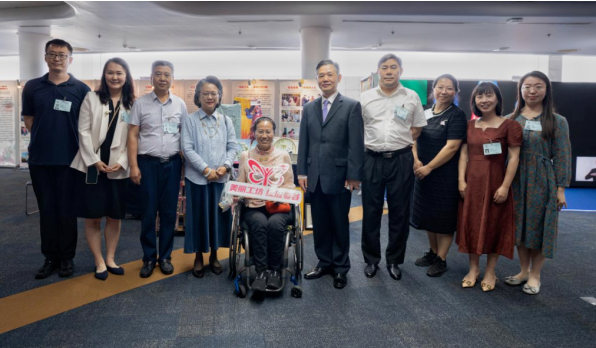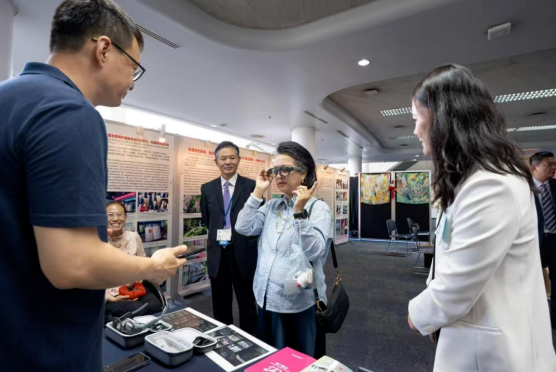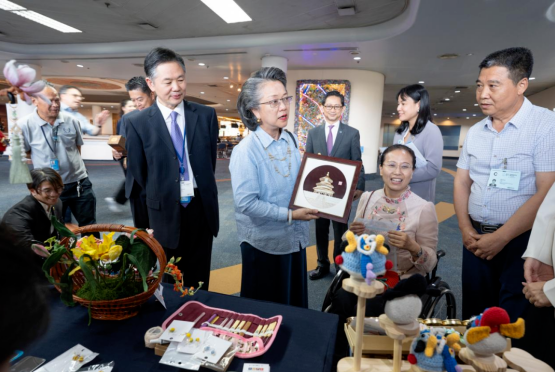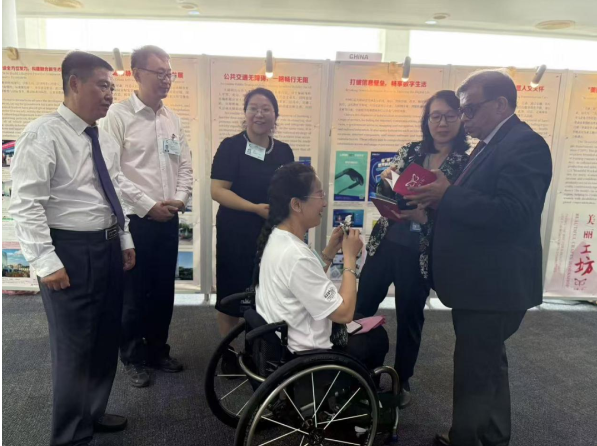An exhibition, which showcases China's achievements in the building of a barrier-free environment and handicrafts made by women with disabilities from"Beautiful Workshops", was hosted by the Beijing Disabled Persons' Federation, commissioned by the China Disabled Persons' Federation, at the 81st session of the United Nations Economic and Social Commission for Asia and the Pacific (ESCAP) in Bangkok, Thailand, from April 21 to 24.
The exhibition highlighted China's efforts in creating barrier-free environments and shared the stories of Chinese people with disabilities, presenting China's progress in the development of people with disabilities.
Approximately 1,000 delegates from 43 ESCAP member states, as well as observer countries, stakeholders, and international organizations, attended the session. The theme of the session was"Regional cooperation for resilient and sustainable urban development in Asia and the Pacific".

United Nations Under-Secretary-General and UN ESCAP Executive Secretary Armida Salsiah Alisjahbana and Permanent Representative of China to ESCAP Ye Xuenong pose for a group photo with staff members from the China Disabled Persons' Federation and Beijing Disabled Persons' Federation. [Photo/cdpf.org.cn]
Representatives from UN ESCAP, as well as delegates from countries including Bangladesh, the Philippines, Papua New Guinea, South Korea, Kuwait, Mexico, Thailand, Japan, Singapore, New Zealand, Iran, Indonesia, and representatives from China's Ministry of Transport and National Forestry and Grassland Administration, visited the Chinese exhibition booth.

Ye Xuenong, permanent representative of China to ESCAP, accompanies Armida Salsiah Alisjahbana, under-secretary-general of the United Nations and executive secretary of the ESCAP, to experience the voice-to-text AR subtitle glasses for accessible information. [Photo/cdpf.org.cn]
This exhibition showcased China's significant achievements in accessible environment development, including the establishment of a legal framework, continuous improvement of policy systems, comprehensive and detailed planning, unified standards for implementation, and the promotion of certification and oversight to ensure construction quality. It highlighted China's efforts in creating barrier-free urban spaces, public transportation, information access, and social services. Additionally, it demonstrated China's active participation in international affairs and efforts to promote the internationalization of accessibility standards.
During the event, attendees were invited to experience voice-to-text AR glasses, which help hearing-impaired individuals access texts transcribed from information that is generated through voice recognition. These glasses also support multilingual translation, receiving praise from the attendees.

Armida Salsiah Alisjahbana, under-secretary-general of the United Nations and executive secretary of the ESCAP, visits the"Beautiful Workshop" handicraft display. [Photo/cdpf.org.cn]
At the"Beautiful Workshop" display area showcasing handicrafts made by women with disabilities, 128 handicraft pieces from 32 categories, such as crochet paintings, shadow puppets, cloisonné enamel, bamboo weaving, kites, paper cutting, and pearl jewelry. These items were made by 11"Beautiful Workshops" and social organizations supporting people with disabilities.
Tang Zhanxin, head of the"Beautiful Workshop" program at a spinal cord injury support center in Beijing, led a team to demonstrate the handicraft-making process on site. She shared the development of the program in China with international attendees in English, highlighting the independence and strength of Chinese women with disabilities and the role of the Chinese government in increasing their income with her personal experience.

Srinivas Tata, director of the Social Development Division of ESCAP, visits the display. [Photo/cdpf.org.cn]
Armida Salsiah Alisjahbana, under-secretary-general of the United Nations and executive secretary of the ESCAP, praised China's achievements, particularly Beijing's efforts in the building of a barrier-free environment and the philosophy behind the"Beautiful Workshop" program.
Ye Xuenong, permanent representative of China to ESCAP, emphasized that the global community is recognizing China's outstanding achievements, and this display offered a unique perspective on China's efforts toward sustainable development.
This event enhanced cooperation between China's disability programs and UN ESCAP, injecting greater momentum into connectivity and sustainable development of disability affairs across the Asia-Pacific region.

